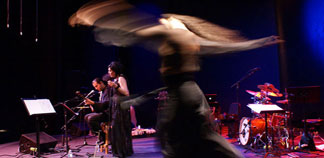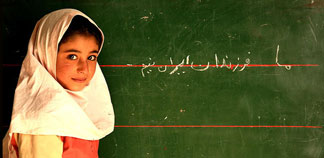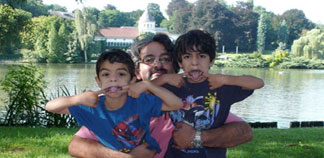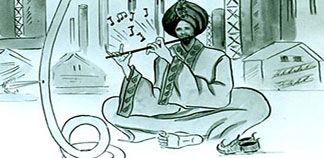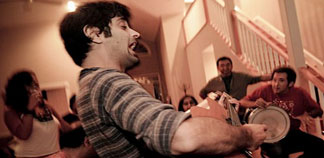به زبان فارسی
PICTORY
LATEST MUSIC
SEARCH
WOMEN
16-Aug-2008 (6 comments)
Discriminatory family law in Iran is on the brink of taking a few steps back! The “Family Protection Bill” passed swiftly and quietly during the first round of discussions of the legal and judicial commission of the Iranian parliament in July 2008, almost one year after it was drafted. Opposition to this bill has solidified one of the largest coalitions formed to protest a bill in recent years. An inclusive and strikingly diverse group of women activists, feminists, human rights defenders, as well as secular and religious groups (including some conservative women’s groups) are opposing this bill and demanding that the government take action to prevent it from passing through parliament for a final vote>>>
IDEAS
14-Aug-2008 (6 comments)
This essay is a tribute to Professor John J. Glanville from the San Francisco State University philosophy department, whom I have known well since 1988 and with whom I closely studied Ancient and Medieval philosophy from 1991 to 1996. He was well advanced in age, his hair was entirely white, and he was still going strong when I knew him. But I have heard through a friend that he is now slowing down a bit and finally reducing his work load. I learned a lot from Professor Glanville. But he was not the only professor from whom I learned much or who left a deep impression on me. >>>
LANGUAGE
14-Aug-2008 (10 comments)
Any way, what follows is a number of some Farsi expressions that are not necessarily funny unless they are translated into English. You may have heard some of them before. This list, which is by no means exhaustive, is your punishment for warding off the good writers from this site. To tell you the truth, I was so bored during the last spring break and tired of persistent watching of the weather channel. Staying idle is so unbearable for energetic individuals like me. I thought doing this may not be that tragic, but it is less tragic that going to Florida and jumping into empty pool. That is what a couple of my drunken students did last year>>>
LIFE
13-Aug-2008 (5 comments)
I have always been fascinated by human relations and the way they work, how people’s feelings and expectations towards each other are formed and how we interpret people’s actions based on our pre-assumptions that although might be clear to us may not be the case for other people at all. I am sure you have many of those people around you who are always complaining. Not complaining about life (that is what we all do and apparently enjoy it very much because otherwise we would have stopped doing it long time ago) I mean complaining about other people’s attitudes, reactions, things we expected them to do and they didn’t, or things they did that we never expected from them>>>
MEMORIES
11-Aug-2008 (7 comments)
Even though she never insisted stubbornly, my mother wanted me to become a theology student or, at least, to have a close relationship with the clergy. After a few casual encounters, I was able to establish a friendly relationship with one of them, a rather handsome young man, who was also Sayyed, let’s call him Mr. H. I liked him because he was moderate and reasonable when expressing his views, and embraced modernity. Mr. H invited me to his Ammameh Gozaroon ceremony. It was really interesting to me. It was like a costumed-made graduation party, a crowning a prince, Taj Gozari. The pre-rolled black turban, which was placed at the top of his head by a high-ranking ayatollah in the midst of the jubilation and the chanting of Slavat by the audience, contrasted his bright-skin face so fittingly>>>
PILGRIM
09-Aug-2008 (8 comments)
October 7th 2008 marks the 80th anniversary of the birth of one of Iran’s most celebrated modern poets, Sohrab Sepehri. On that day, hundreds of people will make their way to the lonely, remote mosque of Mashhad Ardehal, (on the desert road between Kashan and Dilijan), to pay their respects, recite poetry and lay flowers on the grave of this much-loved poet. Awaiting them will be no grand memorial tomb such as that of Hafez or Sa’adi: no pavilion with fragrant gardens, no trees to adorn and give shade. All they will see is a marble flagstone in the courtyard of the mosque (outside the women’s entrance), sometimes trodden below the feet of visitors on their way to prayer. The inscription on the stone reads:>>>
HOT
09-Aug-2008 (18 comments)
Ever since the dot com boom and bust, I don't get too excited about new websites anymore, especially Iranian sites. Iranian sites for the most part either suck, or they are template sites and the greedy developers seem to want to create the most busiest and complicated sites with the teeniest tiniest text that you can't read, almost as if they wanted to make it as hard to use as possible. God forbid they have those awful ads on them too. Farsi language sites are often bad, as the penchant for Iranians to blog like crazy, at times becomes too much to bear. Certainly painful on the eyes. I think the number of Iranians blogging now, is more than the actual number of Iranians reading those blogs>>>
LORCA
09-Aug-2008 (2 comments)
دیشب نمایش یرما اثر فدریکو گارسیا لورکا را دیدم. پیش از رفتن به نمایش دلم می خواست چند کلمه در موردش بنویسم ولی کار و گرفتاری نگذاشت و برای همین موکولش کردم به نوشتن مطلبی به بهانه اجرای یرما. از اجراهایی که در آن یرما از صبح تا شب با لباس خواب جلوی چشمان خوان می چرخد تا او را به رختخواب بکشاند و باز هم تلاشی بکنند تا شاید بچه دار شدند خوشم نمی آید. از ویکتوری که هی مردانگی مذکر خود را به رخ تماشاچی می کشد خوشم نمی آید. از خوان قلدری که زنش را له و لورده می کند خوشم نمی آید. نکته ی شخصیت های لورکا در دوگانگی وجودی شان است. یرما در عین عفیف بودن پر است از امیال سرکوب شده. خوان در عین قلدری و سختی، شکننده هم هست. ویکتور دخترکش نیست، بلکه جفت مناسبی است برای یرما و آن دو خودشان این را نمی دانند بلکه ما هستیم که این را می دانیم و در خلال نمایش به آن پی می بریم.>>>
CYRUS
07-Aug-2008 (37 comments)
In a recent article, titled “UN Treasure Honors Persian Despot,” Spiegel Magazine criticizes the United Nations for recognizing an ancient artifact believed by many to be the world’s first declaration of human rights. The “Persian Despot” of course is Cyrus The Great, the author of the doctrine inscribed on the outer surface of a clay cylinder housed at the British Museum in London where it’s simply known as the Cyrus Cylinder. When this cylinder was discovered in 1879, amid the ruins of Babylon, it made huge headlines in the Christian West. It was the first time a biblical story had been confirmed through archaeology. But the euphoria quickly wore off. The democratic age had no room for a celebrated monarch>>>
INSIGHT
07-Aug-2008 (2 comments)
The picture that Jose Saramago presents of the blind is more repulsive than any Eugenicist dares to draw. The reader asks himself if this writer before writing his book had ever met a blind person or after publishing his story, has he ever received feedback from a blind reader? It is ironic that Mr. Saramago intends to write a book in order to criticize a kind of ideological/spiritual bias by which human society is divided into "us" and "the others", but the result is Blindness in which the author has slipped into one of the worst kinds of bigotry>>>
THE PAST
07-Aug-2008 (16 comments)
ما ایرانیها دو خصیصۀ متنافر داریم: یکی اینکه وقتی به ما بگویند که بالای چشممان ابروست بیتامل میرنجیم و دیگر اینکه همواره این احساس را داریم که خدنگی چشممان را میخلد غافل از اینکه این خدنگ از ابروی خودمان است. کم کم دارند این دو خصیصۀ ظاهرا همزاد، در عرصۀ تاریخ (امروز همراه جامعهشناسی) به خطری جدی تبدیل میشوند: انتقاد تنها از دشمن مجاز است. در نتیجه «عیببینی» بیلحظهای درنگ «عیبجویی» تلقی میشود و بینندۀ عیب در خط مقدم نبرد جای میگیرد. پس لازم است که لشکری برای رویارویی با دشمن خط مقدم نبرد انگیخته شود. از سوی دیگر، چون عادت ما بر این است که هر کس در برداشتهای سیاسی و اجتماعی و تاریخی راه خود را برود و جناحی برای خود راه بیاندازد، تکان بخوری، با دلتای هزارشاخهای روبهرو میشوی، که در مصب هم آرام نمیگیرد. از این است که شمشیرهای پنهان و از روبستۀ ما از شدت چکاچک همیشه کند هستند.>>>
EUROPE
06-Aug-2008 (66 comments)
Ayaan Hirsi Ali’s life is a narrative of sexual repression and gradual emancipation. She became who she is today (Time magazine listed her as one of the 100 most influential people in the world) by redescribing Islam and reacting against radical Muslims - real live people whom she had met in the flesh, not in the book. “I left the world of faith, of genital cutting and marriage for the world of reason and sexual emancipation. After making this voyage I know that one of these two worlds is simply better than the other. Not for its gaudy gadgetry, but for its fundamental values”, Ayaan Hirsi Ali wrote in her autobiography "Infidel">>>
IRANIANS
06-Aug-2008 (8 comments)
It was a summer day year 2000(I think it was 2000). I was in New York City to visit some relatives and enjoyed the stay. A cousin of mine who was interested in Sufism told me about a Rumi conference that was going to be held in the Columbia University. I have had read little about Rumi and remembered some famous lines of his poetry and his love for Shams Tabrizi, but I really did not know so much about him. Also, the only thing about sufism I knew was the paintings of old dervishes with their axe. Back at my parental home we used to have a very elegant copy of the Omar Khayyams Rubaiyat. I enjoyed reading its poems so much that I made my high school special assignment about Khayyam>>>
KHOMEINI
05-Aug-2008 (14 comments)
رابطه ی فقیه و خون, و مفتی و جنون در تاریخ میهنمان مثال های خوبی برای توضیح وتبیین " تداعی مشابهت" اند. این امر نه تصادفی, و نه از دین ستیزی و اسلام ستیزی ست , ملتی واقعیت های دردناک و هراسناک رابارها دیده و تجربه کرده است, وچنین دیدن ها و تجربه ها یی تشابه ای در ذهنیت تاریخی و فردی اش حک کرده است, که ماندگار به نظر می رسد. بی تردید شماری از فقیهان بودند , و هستند که تاب تحمل دگراندیشی را داشته و دارند, که اینان انگشت شمارند. اما اکثریت فقها و مفتی یان خونریز و دارای افکار و کرداری جنون آمیز بوده , و هستند . کافیست تاریخ مان را ورق بزنیم تا با نمونه های فراوانی از این موجودات,که به چندنمونه از آن ها اشاره می کنم, مواجه شوید .>>>
RECENT COMMENTS
IRANIANS OF THE DAY
| Person | About | Day |
|---|---|---|
| نسرین ستوده: زندانی روز | Dec 04 | |
| Saeed Malekpour: Prisoner of the day | Lawyer says death sentence suspended | Dec 03 |
| Majid Tavakoli: Prisoner of the day | Iterview with mother | Dec 02 |
| احسان نراقی: جامعه شناس و نویسنده ۱۳۰۵-۱۳۹۱ | Dec 02 | |
| Nasrin Sotoudeh: Prisoner of the day | 46 days on hunger strike | Dec 01 |
| Nasrin Sotoudeh: Graffiti | In Barcelona | Nov 30 |
| گوهر عشقی: مادر ستار بهشتی | Nov 30 | |
| Abdollah Momeni: Prisoner of the day | Activist denied leave and family visits for 1.5 years | Nov 30 |
| محمد کلالی: یکی از حمله کنندگان به سفارت ایران در برلین | Nov 29 | |
| Habibollah Golparipour: Prisoner of the day | Kurdish Activist on Death Row | Nov 28 |


